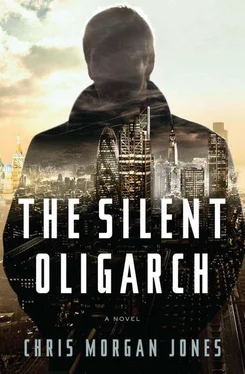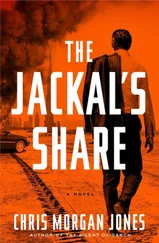Inessa Kirova, the file had said, was a “politically committed journalist with a tendency to address sensitive subjects,” a freelancer who wrote about crime and corruption and sold most of her articles to the campaigning newspaper Novaya Gazeta. She had connections with “difficult… independent” foreign journalists—“that’s you!” she had told Webster, gleefully—and a special interest in the relationship between “big business” and politics: in other words, who was bribing whom. He wondered whether her file was still there, on a numbered shelf in some dank basement, and whether anyone still had reason to refer to it.
The two spravki in front of Webster now suggested less interesting, less productive lives. They had been faxed in a poor translation, gave no clue to their origin and conformed wholly to type. Lock’s was the file of an unremarkable expat, Malin’s of a career bureaucrat. His father was an administrator at a mining equipment company in Novosibirsk and had had two children: Konstantin in 1948, and Natalya in 1952. Malin had married Katerina Karelov in 1971, and they had had two children. They lived, officially, in an apartment of thirty square meters near Leningradsky station in Moscow, but it was highly unlikely they were ever there; the Malins’ real apartment would almost certainly be a rather grander affair.
He had been educated at the Tyumen Industrial Institute, and later at the Gubkin Russian State University of Oil and Gas in Moscow. Since 1971 he had worked at what was now the Ministry of Natural Resources, in what positions it did not say. He was a very old hand.
It went on. Malin was a man of “high inner discipline” who had through “loyalty and clear purpose” risen to a position of “total trust and positive influence” within the ministry. His contribution was valued “at highest levels” and had resulted in his being awarded an Order of Merit for the Fatherland in 2003. He was a man of “true principle” and this had allowed him a career “free of the fighting of political factions.”
This was instructive—such a clean file told him that Malin was well protected—but useless nevertheless; even a little discouraging. Webster’s brief from Tourna had a crazed simplicity about it, and was probably impossible, not to say dangerous. He would need something rather stronger than an intelligence file that Malin had probably approved himself.
He turned from the source material to the summary of the whole report. Langland Resources, it seemed, was Malin’s oil trading company and was based in Vienna. It had been run by a Dmitry Gerstman, but he had left three years before and another Russian, Nikolai Grachev, had taken his place. There were profiles of each, and a description of Langland, which employed twenty people, or thereabouts, and sold Russian oil into markets around the world.
Webster skipped a long paragraph on Malin’s background, taken not quite verbatim from the spravka . The next section was more interesting.
Langland’s profit margin is believed to be artificially high because it engages in transfer pricing with its suppliers in Russia. Producers sell oil to Langland at reduced prices and Langland sells at normal prices to its customers, taking the difference. Any losses are borne by the state-owned suppliers affected and ultimately by the state itself.
Sources close to Russian intelligence have indicated that Langland’s profits are channeled back into Russia through a series of offshore companies and funds and ultimately through another Malin-controlled entity, Faringdon Holdings Ltd. Faringdon is an Irish offshore company… that owns majority stakes in a number of oil and gas exploration and production companies in Russia and Kazakhstan. Media reports state that Faringdon was set up and is managed by Richard Lock, a lawyer of Dutch descent qualified in England. Lock has lived in Moscow since 1993 and is understood to work full-time for Malin.
Not too bad, thought Webster, for what it was. A useful start.
At the very back of the file was a cutting from a magazine, neatly folded and kept in a plastic wallet. It showed a group of Russian dignitaries, perhaps a dozen, posing for a photograph. Malin was in the front row, third from the left. Webster peered at the likeness; he had never seen a picture of him before. With his eyes half closed, in black and white, his jaw set, unsmiling, he could have been a Soviet functionary from any decade of Communism. But there was a difference. Malin was rich—had grown rich stealing from the state; his money was Russia’s money. Webster dared to imagine for a moment Malin paraded through the streets of Moscow as a traitor to the people, his image on every newspaper front page below fat black headlines proclaiming his demise.
UNTIL TWO MONTHS EARLIER, Ikertu Consulting Limited had occupied three floors of a Georgian building on Marylebone Lane. Webster had loved it there, and so had everyone else. Next door on one side was a tiny Japanese restaurant; on the other a haberdasher’s; and opposite in a row a delicatessen, a pub and a launderette. Snaking through a grid of sober streets Marylebone Lane was insistently London: various, high and low, apparently unplanned.
The company had grown too big for such levity, however, and had moved two miles east to a modern building on Cursitor Street, just off Chancery Lane. Hammer liked being in among the lawyers; Webster did not. He preferred being near the crooked square mile of Mayfair, with its front companies and its brass plates and the strong smell of unexplained wealth, because that, in a city that invited them, was where intrigues tended to begin and end. Here in Holborn lawyers earned their money in transparent six-minute units and worked hard to extinguish intrigue wherever they saw it.
Webster was back in the office. He stared at his e-mail, thought in a disconnected way about the cases he had left behind while on holiday, and waited for Hammer, who came to work late and left late and was no doubt still running in. Hammer lived in Hampstead so that he could run on the Heath. He ran to work, and he often ran home from work. He was fifty-seven and must have run fifty miles a week, unmistakably a New Yorker in his short shorts and his baseball cap. His small frame carried no weight, and he had the clipped, straight-legged style, neck forward, almost a speed-walk, of a man who had been running all his life. When he got to the office he would shower straightaway and dress in clothes that were too big for him and unconsciously American (pleated trousers, tasseled loafers, boxed jackets with boxy shoulders and wide lapels) before wandering around greeting his staff, still aglow, his yellow shirt newly spotted with sweat.
Ikertu was everything to Hammer. He lived alone, with a housekeeper, ate badly, read books about military campaigns and game theory, and worked for his clients, who adored him. What Hammer and Ikertu did best, and liked to do to the exclusion of all else when times were good, was contentious work, in the jargon of their legal neighbors. They fought for their clients. They fought to recover money, to redeem reputations and dismantle them, to expose corruption, to overtake the competition, to right wrongs and sometimes to cover them up. Most of the time they worked for the right side.
On the wall of Webster’s office hung a political map of Europe and Asia, and into it he had stuck colored pins to mark the heart of each project. He looked at it now and wondered where this case would take him. There were tight clusters over Kiev and Almaty, Warsaw and Vienna; looser groups across the Urals, the Caucasus and southern Siberia; four or five apiece in Prague, Budapest, and Sofia; and solitary outliers in Tallinn, Ashgabat, Yerevan, Minsk. It was a heat map of money and trouble. He had stopped sticking pins in Moscow, a thick dark mass in the middle.
Читать дальше












